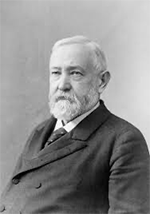President Benjamin Harrison
Benjamin Harrison was a lawyer, a U.S. Senator, and the 23rd President of the United States. 
He was born on Aug. 20, 1833, in North Bend, Ohio. His family traced its roots to the Jamestown colony. His great-grandfather signed the Declaration of Independence. When young Benjamin he was 7, his grandfather William became President. Benjamin grew up on a farm owned by his father, John, and spent a lot of time outdoors as he was growing up. After learning in a one-room schoolhouse, he attended Farmer's College and then Miami (Ohio) University, from which he graduated in 1852. It was at Farmer's that met Caroline Scott, whom he later married; they had two children, Russell and Mary. Harrison moved to Indianapolis, passed the bar, and began practicing law. He joined the Union Army during the Civil War and served under Gen. William T. Sherman during the campaign to take Atlanta. Harrison commanded troops at a handful of battles including the one for control of Nashville. He began as a captain and ultimately attained the rank of brigadier general. His postwar career path began as a court reporter for the Indiana Supreme Court. He chose politics as a profession and ran for both the Indiana governorship and the U.S. Senate. He won election to the Senate in 1881, serving for one term. He emerged as the Republican Party's presidential candidate in 1888 and defeated the incumbent, Grover Cleveland, winning the electoral vote despite losing the popular vote. As President, Harrison presided over a large expansion of the federal budget, which exceeded $1 billion for the first time. He championed civil rights bills, none of which passed while he was in office. He did sign into law the Sherman Antitrust Act, which targeted monopolies and other big corporations. Other Harrison facts:
Harrison ran for re-election in 1892, again facing Cleveland. Of particular interest was the McKinley Tariff, a protectionist tariff that raised the average duty on imports from 38 percent to 49.5 percent. The electoral and popular vote both went to Cleveland. Harrison's wife died that year. Four years later, he married Mary Dimmick, his wife's niece; they had a daughter, Elizabeth. Harrison moved to San Francisco and taught at Stanford University for a time. He returned to his law practice and, at one point, represented Venezuela in a legal fight with the United Kingdom over the British Guiana-Venezuela boundary. Harrison died of pneumonia on March 13, 1901, in Indianapolis; he was 67. |
|
Social Studies for Kids
copyright 2002–2026
David White





